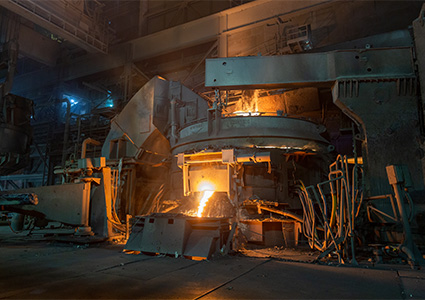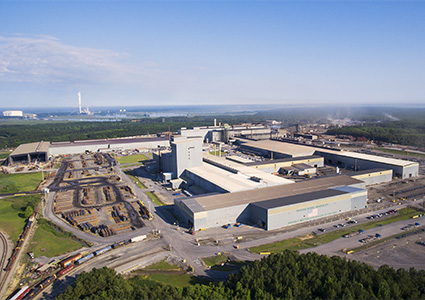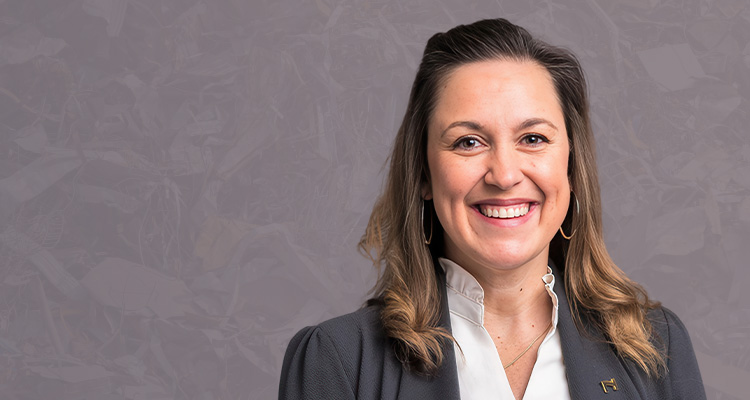Empowering others and embracing circularity, Tabitha Stine of Nucor unpacks steel’s role in the global energy transition
With more than 22 years of experience in structural engineering design, Tabitha Stine’s strategic vision has led her to her current role as General Manager of Energy Solutions Services at Nucor Corporation (Nucor). Tabitha has previously served as Vice President of the American Institute of Steel Construction (AISC), and demonstrated her passion for sustainability, circularity, and innovation throughout her career, as well as a more personal commitment to empowering other women in the industry.
Emphasizing the importance of clean steel, Nucor embraces the concept that the green economy is going to be built with steel and the steel it’s built with matters. Facilitating initiatives that solve construction challenges for owners, engineers, or architects, this division strives to offer innovative solutions that help companies navigate the ongoing global energy transition.
“Although I’ve been at Nucor for just under five years, I’ve spent my lifetime in construction, having grown up in a small town around my family’s construction business,” Tabitha begins. “I loved the industry and decided to study civil engineering, securing my first professional role as a structural engineer designing power plants. I learned a tremendous amount about the use and benefits of steel construction, and later moved to work for a trade association, the AISC.
Thought leadership
“The AISC supports the integrity of domestically fabricated structural steel for the US construction market, mainly for buildings and bridges. I eventually led the institute as Vice President through a period of product innovations and technologies, and at the time, one of the key members was Nucor. As the largest mill operator in the US and the biggest recycler in the Western Hemisphere, Nucor had a vested interest in protecting the US steel industry.
“I wasn’t necessarily looking to leave the AISC, but an opportunity came along in 2020, to help establish a new division within Nucor, the Construction Solutions team, and I was simultaneously terrified and excited,” she recalls. “Nucor boasts 32,000 employees across more than 300 locations, and accounts for one quarter of steel produced in the US. Specifically, the Construction Solutions division was set up to combine assets across the company and introduce a solutions-based sales approach.
“I spent just over three years with the Construction Solutions team, launching new products to the warehouse and data center sectors and introducing turnkey innovations in a post-Covid market. We collectively realized that many conversations about construction projects were inherently linked with discussions around energy security, leading Nucor to consider the ways in which we could support our customers to decarbonize while securing our own clean electricity. So, using my experience of building the Construction Solutions division, I established the Energy Solutions team to capitalize on commercial opportunities in the energy field. I have also come to lead all of Nucor’s marketing, driving opportunities for us to lead the industry’s thought leadership arena.
“Although I’m an analytical person, I was never a traditional engineer in that I always gravitated towards people,” Tabitha reflects. “In the past, I’ve felt frustrated with the lack of progress in construction, but energy is a whole different story. We’re in the middle of an energy transition globally, with ongoing discussion about how to secure clean, responsibly sourced energy and materials. It is a dynamic and constantly changing industry with collaboration happening across companies and sectors to find the most appropriate energy solutions.”
Empowering women
As a woman working in a field historically dominated by men, Tabitha is a strong leader shaping the future of women’s involvement in the construction and energy industries, and her contributions have recently been recognized with Tabitha’s participation in the documentary film, Women of Carbon. “I recently attended the premier in New York, where it was refreshing to see an audience of over 50 percent women,” Tabitha reflects. “There was genuine passion among the attendees, and three of us who were featured in the documentary later shared the motivations that drive women into these fields during a panel discussion.
“Although women often have to break through a glass ceiling to enter roles typically occupied by men, sustainability related roles are different in that most of the time, they are brand-new positions. These roles are uncharted, attracting more women to apply. Women typically feel a responsibility to share our passions and empower other women. My responsibility in supporting the next generation as one of Nucor’s leaders is not lost on me; we must encourage and empower others through deliberate mentorship to bring new ideas and talent to our industry.
Securing a clean energy supply
“Also, as a mother, I feel a natural maternal instinct to protect the planet for the next generation by doing the right thing for my family, my company, and the environment. The whole time you’re parenting, you never know if you’re doing the right thing and there’s no ‘easy button’ for parenthood whilst maintaining a career. However, it was incredibly rewarding to see my daughter, a freshman going into environmental science and majoring in sustainability, representing the next generation at the end of the Women of Carbon documentary.”
 Turning to Nucor’s operations, Tabitha shares how an electric arc furnace (EAF) means Nucor’s production naturally leans into sustainability and circularity. “There are two ways of making steel: firstly, using an EAF, which is a circular method that uses electricity to melt scrap metal, the primary feedstock, to produce steel with upwards of 70 percent recycled content. The other method is extractive, using a blast furnace that relies primarily on raw materials like coking coal and iron ore,” she explains. “An EAF emits just one third of the carbon per ton of steel compared to using a blast furnace, yet it produces steel of the same grade and quality. Currently, only 30 percent of the world’s steel is made using an EAF.
Turning to Nucor’s operations, Tabitha shares how an electric arc furnace (EAF) means Nucor’s production naturally leans into sustainability and circularity. “There are two ways of making steel: firstly, using an EAF, which is a circular method that uses electricity to melt scrap metal, the primary feedstock, to produce steel with upwards of 70 percent recycled content. The other method is extractive, using a blast furnace that relies primarily on raw materials like coking coal and iron ore,” she explains. “An EAF emits just one third of the carbon per ton of steel compared to using a blast furnace, yet it produces steel of the same grade and quality. Currently, only 30 percent of the world’s steel is made using an EAF.
“However, as Nucor helps the energy industry to decarbonize, we recognize using an EAF heightens our Scope 2 emissions and we’re passionate about finding clean energy sources to fulfil our demand. We’re investing in nuclear technology with the aim of being able to power our steel mills with on-site or near-site nuclear small modular reactors with both fission and fusion technology by the end of this decade. As well as maintaining close relationships with utility companies, we’ve recently announced a $50 million investment package for small companies that will help us secure a clean energy supply moving forwards.
“In terms of energy transition, we believe Nucor has the breadth of products, capabilities, and research and development to meet the needs on the horizon,” Tabitha shares. “We constantly track megatrends like reshoring and the demand for a more robust energy grid alongside renewable sources, which are all steel intensive activities. We’re also now more integrated with our data center customers, having established a data systems company to provide racking and installation. We’re being more deliberate about connecting directly with companies, forming strategic partnerships where we are a solutions provider for their sustainability and product availability concerns.
Accelerating circularity
“Also, as the largest recycler in the Western Hemisphere, we must consider how to recycle the batteries used in hybrid and electric vehicles to recover the precious metals needed for electrification. With a lack of recycling infrastructure for EVs, there is currently not a supply chain to safely harvest batteries, meaning most EVs at the end of their life are shipped from the US to Asia. This needs to change, and Nucor is on a mission to accelerate circularity beyond steel.”
With this in mind, Tabitha turns her attention to the future of not only Nucor, but the industry and energy transition at large. “I anticipate many trends and developments in the coming years, from AI and automated technologies to electrification and the impact of data centers on our electrical grid,” she says. “Energy is the future, and as we increasingly adopt renewable energy, clean energy sources will become more cost effective to construct and operate.
“We are also going to see more robust innovation in terms of automation and robotics, alongside electrification of the grid, and so we have a dedicated team at Nucor examining emerging opportunities and challenging our team to think differently, going beyond our roots as steel producers to help solve global challenges.
“However, we’re also aware that the green economy is going to be built with steel, and the steel it is built with truly matters,” Tabitha concludes. “This statement is at the heart of everything we do at Nucor, and we’ll continue to strengthen our production processes as we transition from a commodity company to an industrial thought leader.”
